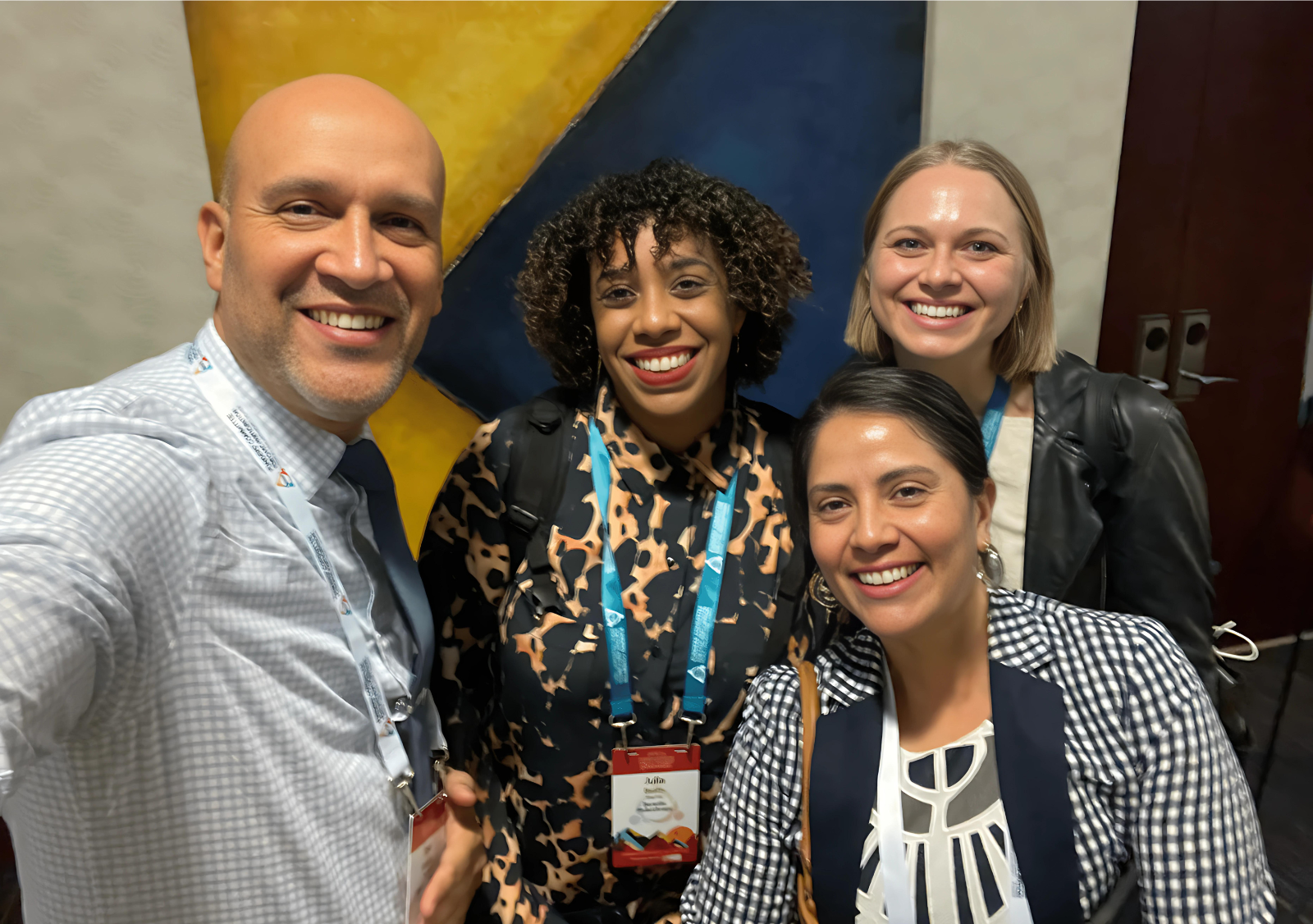Rethinking Risk: How Foundations Can Show Up for Social Movements When Threats Are Rising
By Hanni Hanson
Social change carries inherent risks. Here’s how funders can show solidarity by taking some of their own.
Last month, I gathered with three Compton Foundation grant partners at the Funders Committee on Civic Participation conference for a session on shrinking civil society space. These partners each lead with a great deal of courage and resilience in the face of heightened risk, from legal threats to increasing danger of political violence. Over the course of the conversation, they invited funders to find our own courage to practice solidarity rather than move from fear, and to recognize how our own actions will make this moment easier—or harder—for social movements to navigate.
Julia Beatty, Director of the Black-Led Movement Fund (BLMF) at Borealis Philanthropy, spoke about attempts to restrict the right to protest that especially target Black organizers. Prosecutors have used RICO and domestic terrorism charges and attacks on community bail funds as ways to repress political organizing activity. Legal threats to race-specific programming after the Supreme Court’s affirmative action ban mean that foundations are pulling funding for racial justice work. In response, BLMF has continued to move more funds to Black-led movement organizations and innovate its participatory grantmaking processes. BMLF exemplifies what it means for philanthropy to center the needs and experiences of grassroots leaders.
The executive director of the National Latina Institute for Reproductive Justice, Lupe Rodríguez, spoke about the resilience of the Latina Institute’s grassroots activists, or poderosas, in continuing to show up for the work, even when experiencing increased surveillance and criminalization. In the midst of a rhetorical landscape that demonizes immigrants and those seeking abortion care, the Latina Institute is supporting its network of poderosas to advocate assertively for what actually makes communities safe and secure, including access to abortion, all reproductive healthcare and universal public safety nets. For example, the Latina Institute is raising funds to ensure it can provide legal support funds for its members who get arrested during actions.

Jose Vasquez, executive director of Common Defense, shared how veterans are being targeted for radicalization by extreme right and antidemocratic groups, as evidenced by the January 6 Capitol insurrection. In response, Common Defense is training veterans in deescalation and deradicalization so they can interrupt political violence and counteract antidemocratic extremist organizing. Common Defense’s nationwide programs create a political home for a diverse, grassroots movement of progressive veterans, training them to be community organizers and spokespeople and leveraging their experience serving the country in the armed forces to advance a justice-centered, multiracial democracy at home.
Confronted by the challenges of shrinking civic space, when political discourse is at a fever pitch, these organizations are pivoting to protect their organizations and constituencies and still advance their mission of social transformation. So how can funders follow their lead? Julia, Lupe and Jose had some ideas!
What funders can do
1. Keep moving the money.
Don’t be afraid of generously funding movement organizations—in this political moment, it’s needed more than ever. In addition to core funding, ask grantees if they need supplemental funds to cover additional costs, such as attorney fees, bail funds, wellness funds, safety planning and safety support, and/or additional leave or sabbaticals to counter the burnout of working under intensive conditions.
Our grantees have reported that many of their funders are retrenching. After vast efforts to move more money with fewer strings during COVID, foundations are walking back their commitment to trust-based practices in favor of more paternalistic ideas of impact. Commitments to fund racial justice work have declined. Funding for grassroots advocacy has dwindled. And although endowments have grown, many foundations are not increasing their grants budgets to match, even after years of record inflation. Now is not the time to hoard wealth, but to move it in support and defense of the communities and organizations under attack.
2. Move the money well.
Simply moving money isn’t enough if you create unnecessary hurdles or uncertainties in the process. Organizations need long-term grant commitments that increase with the rates of inflation over time. They need unrestricted funding that allows them to adapt quickly to changing conditions. They need funding without strings attached. They need more agency over where the money goes. And they need to receive those funds in a way that doesn’t require unnecessary paperwork or grant reports that no one will read or draw lessons from.
As funders, we have a lot of latitude to make our partners’ lives easier instead of harder. Before you request anything from a grantee partner, ask: what purpose does this serve, and is it really necessary? They have enough to put up with from those who aren’t purportedly on their side!
3. Think and act like an organizer.
Of course, the recommendations above may be easier said than done. But if your board, boss or general counsel remains unconvinced, don’t assume that has to be the end of the conversation. Get curious about what it would take to move these folks, and think of this work as an organizing effort (which it is!).
Sign up for a training through Justice Funders or re:power to find organizing skills and allies. Make a power map to identify who in your organization you need to move and what your points of leverage and influence are. Buy a community organizer you know a cup of coffee and ask them for advice. Solidarity requires those of us in philanthropy to be organizers, too.
4. Be a connector.
One of the many privileges of philanthropy is being able to sit at the 30,000-foot level and see patterns across organizations, issues, and sectors. With that positionality and access comes the responsibility to feed that information back to the grant partners with whom you’re in relationship.
Ask what your partners need and be on the lookout for how else you can support them. As you sit in funder spaces, ask yourself: who else should your grantees know because they are going through similar experiences? To what resources, toolkits, or learning communities could you connect them? What patterns are you seeing across organizations, issue areas, or sectors? What can you share with other funders that can influence the way they move money?
5. Redefine “risk.”
Our partners, colleagues, friends and others working for social justice and social change are facing profound risks. These threats do direct damage to the physical and emotional security of people and organizations. They also make civic participation harder and take us even further from a functional, just multiracial democracy. Although most of these risks are directed at the grassroots for now, we need to be realistic about the likelihood that closing civic space will impact philanthropy too.
It’s possible that philanthropy will meet this moment by retrenching further and backing off from racial justice priorities. We as a sector could bend over backwards to try to mitigate risk, protecting our institutions from scrutiny and only funding things where we feel certain there will be no backlash. But the truth is that philanthropy as a sector has a high capacity to take on risk. We have the privilege and resources to do so. And those of us with power over resources must be in solidarity with the communities and organizations on the front lines.
Funders committed to civic participation need to get more comfortable with the notion of “risky” grantmaking in order to better protect and support our grantees on the front lines and counter the authoritarian forces truly making our communities less safe. Now is a time for us to show more courage, not less.

Hanni Hanson, Director of Programs
Hanni Hanson (she/her) is dedicated to moving money to movement partners with trust, curiosity, respect, and ease. She infuses her work with a belief in the power of relationships to foster transformation and a fierce commitment to the creation of a multiracial democracy, safe communities, and a healthy planet.
Learn more about Compton Foundation Staff.